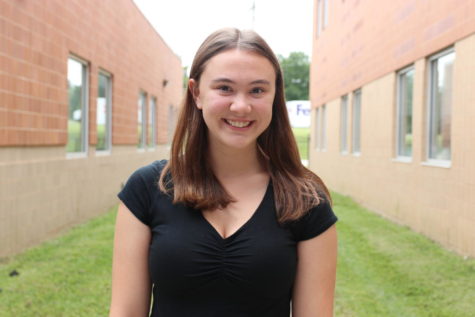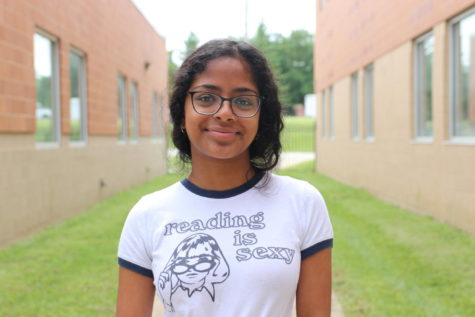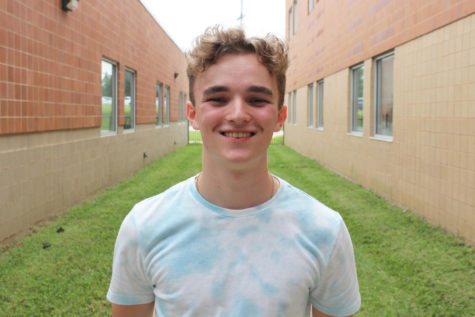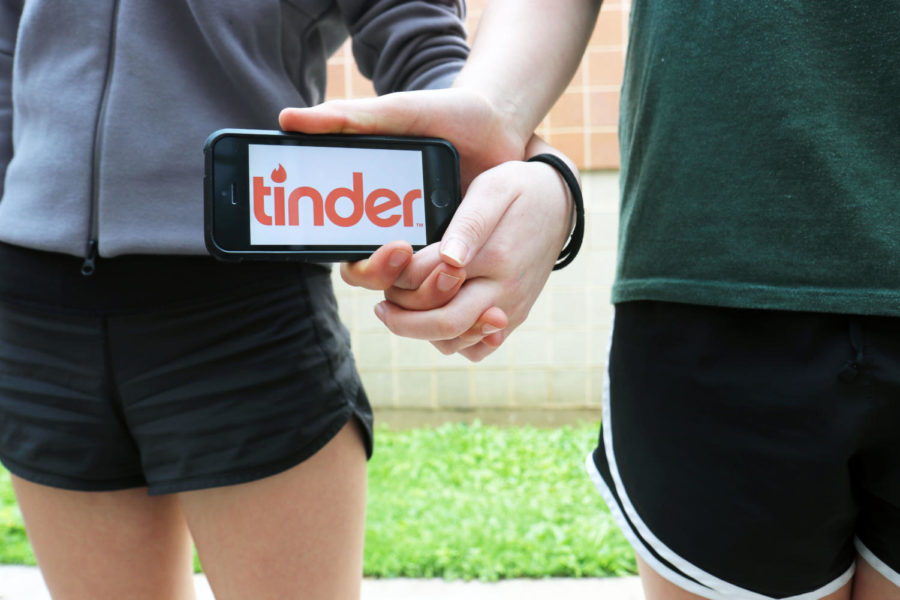Analyzing Modern Dating Culture
Media by Jackson Estwanick
Helena Schmidt, junior, saw her boyfriend for the second time eight months into their relationship.
Schmidt and her boyfriend, Justin Garces, US Under-17 Men’s National goalkeeper, initially met at a soccer game when her sister was invited to perform the national anthem.
“At the game, I got to meet some of the guys because she was singing,” Schmidt said. “[Garces and I] followed each other on Instagram, then he added me on Snapchat, and it just went from there.”
Due to Garces’ constant travelling with his soccer team, their relationship solely relies on social media.
“He travels all over the world, so I don’t get to see him a lot,” Schmidt said. “So basically it’s just social media and FaceTime.”
Schmidt’s avid utilization of social media is far from unconventional, however; dating apps such as Tinder and Grindr are on the rise, along with dating sites in general.
Julie Albright, professor at University of Southern California, said that the introduction of the Internet as a dating tool has revolutionized how we think about relationships and love.
“Because the Internet is now available on smartphones, one literally has an array of potential partners in one’s pocket,” Albright said. “It’s the number three most common way people meet their spouses.”
Albright also mentions how trust has become a definitive point of contention for people, since it has become so easy to cheat or succumb to infidelity with so many other attractive people available to peruse online.
“Love has completely changed,” Albright said. “People are no longer as willing to commit, since there’s always that feeling that a better person might be just one more swipe away.”
The no commitment policy certainly rings true for John Smith, whose name has been changed to protect his identity, who often uses Grindr to find potential partners.
He downloaded Tinder at 16 and, not finding much success, downloaded Grindr soon after. For Smith, Grindr has led him to more partners.
“Some people might say I’ve found successes,” Smith said. “But I have commitment issues, so stuff like that doesn’t really work out, but, overall, I’ve found success.”
Smith said he finds it difficult to just happen upon people in the gay community who he’s willing to pursue, and found a similar issue with Tinder.
“It’s a lot harder to find someone in the gay community by chance so those apps make it a lot easier to find people,” Smith said. “Tinder doesn’t have as many gay people, so I downloaded Grindr afterwards.”
Smith said he doesn’t really have an ultimate goal for using Grindr, and that a relationship, a hookup, or anything in between is fine with him. Regardless of the situation, however, Smith continues to take precautions.
“I always make sure to tell a friend if I’m going on a date,” Smith said. “And I always ask the last time they’ve been tested and if they’re positive because that’s a big issue in the community.”
Smith said he checks Grindr a few times throughout the day, as it’s his only method of finding potential partners.
“I don’t really feel comfortable dating someone here at Marquette,” Smith said. “It’s easier to find people outside of school who are like-minded.”
Smith said he finds it easiest to use the apps rather than traditional dating methods because he won’t be required to interact with a partner if the relationship goes south.
“If something happens, or I don’t want to talk to a person ever again, you don’t have to confront them in school,” Smith said. “It’s almost like a taste of the real world, where you can just move on.”
Jane Doe, whose name has been changed to protect her identity, has used Tinder for the past three months to pursue relationships.
“It’s been an on and off thing,” Doe said. “I’m not constantly on it, but I definitely use it.”
Like John Smith, Doe finds it much easier to interact with others via social media and dating apps.
“I definitely feel like talking to people at school is much harder than texting people,” Doe said. “Especially when it’s people you’ll never see. I really like that the premise doesn’t include commitment.”
Doe said that her main goal of using Tinder is to feel out the dating pool, see what she’s up against; however, like Smith, she’s fine with anything that might occur.
“Since these people are way older than me, nothing’s gonna happen,” Doe said. “But if it does, I’m not against it, since I’m almost 17 and most of these people are 18.”
However, Doe said that most of the people she talks to do think she’s of age. But the one time she did go on a date, she didn’t feel a connection, and didn’t choose to disclose her true age.
So far, Doe has never had a bad experience. To prevent any danger, Doe always carries around pepper spray and on her date, she drove herself and told her friends about her whereabouts.
“I’ve definitely matched with some people and talked to them for a while,” Doe said. “But a lot of the times it’s hit or miss, and I’m very picky about who I’m with, so if I don’t feel a connection, right away I don’t choose to continue it.”
Ryan Bixby, chemistry teacher, feels that the modern approach to dating is a far cry from what it was when he was in highschool.
“I think a lot more communication is done electronically,” Bixby said. “There’s a lot of ‘talking’, which is texting, which becomes flirty texting, and then the relationship, which didn’t exist back then.”
Bixby also said social media makes it more confusing and difficult for students nowadays to rid themselves of the memories of an ex, or their breakup.
“High school relationships are doomed to fail,” Bixby said. “So when you date someone for however long, your social media is littered with them, and both of your social medias are fused together, so how do you ever disentangle yourself?”
Bixby also mentions that the act of deleting a person from one’s social media is almost more difficult than being in the relationship itself.
“You have to go back and do this reverse curating of your digital life,” Bixby said. “It’s like this extended homework project, assigning future me to change my entire social media if a relationship goes south.”
Serge Desmarais, professor at University of Guelph in Canada, said that, while we think social media has completely changed dating culture, in reality, there’s only one true difference.
“Social media and online dating sites have had a definite impact on how people initiate dates,” Desmarais said.
However, he does agree that social media has affected the way in which people view others in terms of trust and commitment.
“Research has shown that social media affects people’s expectations since most people only display themselves in a most positive light that is not an accurate reflection of reality,” Desmarais said.
Despite the fact that Americans think online dating is most prominent in America, Desmarais said that it’s a very large worldwide phenomenon, with more than 50% of people in America, Canada, and Britain find online dating a sensible approach to finding a partner.
However, Desmarais said that dating apps and social media in general cause a lot of extra jealousy between already existing couples.
“We tend to see on social media displays of our best constructed self,” Desmarais said. “Photos of the coolest places we visit, photos of ourselves looking especially fantastic, photos of the best parties with the most awesome people. My doctoral students and I published a few articles on how certain Facebook photos can cause jealousy between couples.”
Although dating apps have been seen in a negative light because of the stories in which it goes wrong, Demarais mentions that dating apps have definite advantages that make them popular.
“Dating apps typically allow for a person to extend their dating pool beyond what it is immediately available,” Demarais said. “That’s especially good if one has a small circle of friends and few available dating opportunities.”
Desmarais also adds that, despite those plus points, dating apps can only get a person so far.
“In the end, dating is about face-to-face interactions and these cannot be replicated online,” Desmarais said. “The only thing that dating apps provide is an opportunity to meet someone; the rest only happens when people meet.”
Brenda Casey, MHS social worker, said she has found that dating culture has changed as social media has a negative impact on relationships.
“What I’m finding is that there are a lot of miscommunications with text messages because students aren’t understanding the inflection and the way it was written,” Casey said.
Casey has spoken with two students at Marquette who use dating apps, one of whom was dating someone in a different state.
“The child came to me because they were having an argument,” Casey said. “And I thought, ‘Wow, that’s what you’re arguing about? You two hardly even know each other.’”
Casey also does private practice and has seen multiple cases in which her clients deal with issues arising from online dating.
“I had a client who was on a dating site, and he was 21 at the time. He thought he was hooking up with someone who was 18,” Casey said. “They were together a few times, but then he found out she was 14. Luckily nothing of a sexual nature happened, because if it did, he could go to jail.”
Because it’s so easy to pretend to be someone who you’re not, Casey said the age restrictions on certain apps and sites feel necessary, but aren’t necessarily enforceable.
“The whole age thing is a joke,” Casey said. “You can just click a button and say you’re 18.”
While Casey far from condemns dating apps, despite the potential issues that come with it, she said that she feels like it shouldn’t be the end all be all.
“I’m a big believer in the idea that there’s a physical attraction,” Casey said. “Not just in terms of looks, but also just the aura two people give off.”
Casey, similar to Desmarais, believes that social media profiles only give people the idea of who they wish to be.
“We can be who we want to be, our own fantasy of who we are, when we are communicating through text,” Casey said. “But that doesn’t work so well in the real world.”
Your donation will support the student journalists of Marquette High School. Your contribution will allow us to purchase equipment and cover our annual website hosting costs. You may become a PATRON by making a donation at one of these levels: White/$30, Green/$50, Blue/$100. Patron names will be published in the print newsmagazine, on the website and once per quarter on our social media accounts.

Sarah Harris, senior, is the Associate Editor for the Messenger and is also the Copy Editor for the Medallion, Marquette's yearbook. Sarah is involved...

Mansi Mamidi, senior, is the Copy Editor for the Messenger. She is president of Mock Trial and is also a part of Youth and Government and SASA. She learns...

Jackson Estwanick, senior, was the Executive Producer of MHSNews and the Messenger from 2018 to 2020. He also cadet taught Intro to Digital Media Production....



